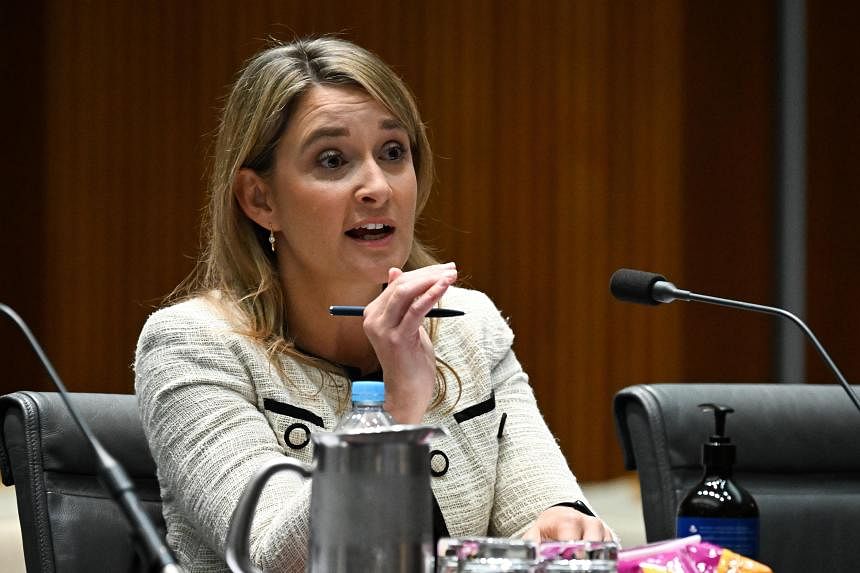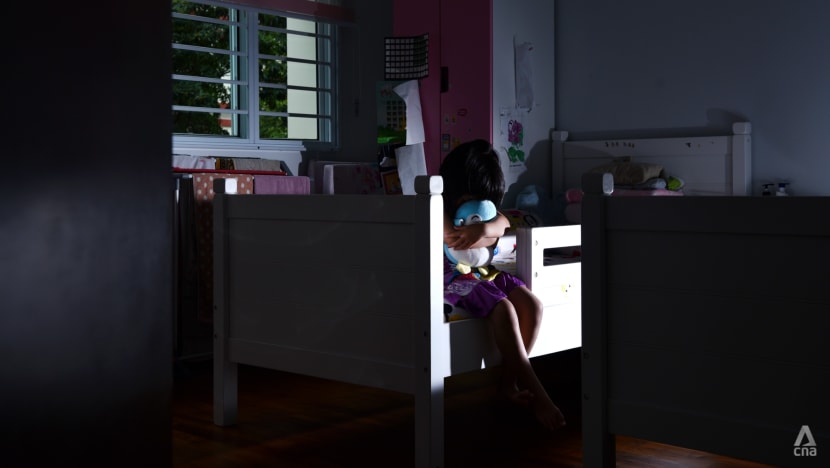No concerns detected during weekly check-ins with girl who was sexually abused for nearly 3 months: MSF
The girl was taken in by a man after she was traumatised by her mother’s death and father’s sexual abuse. But the man sexually assaulted her almost every day for close to three months.
Photo illustration of a child in distress. (File photo: CNA/Jeremy Long)

04 Dec 2023
Warning: This story contains references to suicide.
SINGAPORE: Authorities did not detect “sexual abuse concerns” during weekly sessions with a girl who was sexually assaulted almost every day for about three months by a man who wanted to adopt her.
In response to queries from CNA, the Ministry of Social and Family Development (MSF) said on Monday (Dec 4) that the girl did not “disclose the abuse to them” until she told a school teacher.
Last Tuesday, the 39-year-old man was
sentenced to 10 years’ jail and nine strokes of the cane for his crimes.
He pleaded guilty to four counts of exploitative sexual penetration of a minor who is 16 or 17, with another nine charges taken into consideration.
The girl was under the care of MSF and in the process of being adopted when she moved in to stay with the man and his wife full-time.
She was sexually assaulted almost every day during her stay from September 2020 to November 2020, the court heard.
Questions were raised after the court case about why the abuse went undetected for nearly three months. The girl also started to engage in self-harm during the period of abuse.
The ministry told CNA that the girl had been receiving support from a team of professionals, which included psychologists and case workers from a treatment centre, a psychiatrist and a psychologist from the Institute of Mental Health (IMH) and a Child Protection Officer.
During her stay with the couple, check-ins and sessions were conducted every week on average by at least one of the professionals, where the girl's well-being, safety and progress were monitored.
The couple also had regular sessions with the professionals and were "observed to be capable of providing supportive care" for her.
"During this period, the professionals did not detect sexual abuse concerns, nor did the young person disclose the abuse to them until she told her school teacher in Nov 2020," said MSF.
"Although the young person had some signs of self-harm, that would not have indicated that she was being sexually abused, as due to her past trauma history, the young person had ongoing self-harm behaviour before she was under the care of the couple."
THE CASE
The girl, who is now 19 years old, was 13 when her mother took her own life in front of her in 2017.
She suffered from adjustment disorder with depressed mood after, but the girl’s father did not let her or her siblings mourn their mother’s death.
The girl was sexually abused by her father in January 2018, several months after her mother died. She overdosed on medication and was admitted to the Institute of Mental Health, where she was diagnosed with post-traumatic stress disorder.
She was removed from her father’s care about two months later and placed in the care of a family friend. The teenager stopped engaging in self-harm, but this resumed in June 2018 after the suicide of a close friend.
In September 2018, MSF placed her in a treatment centre aimed at helping girls who have suffered trauma or abuse.
The man, who cannot be named to protect the identity of the victim, first met the girl that month when he ran a programme at the treatment centre. He was a manager at a company which conducts camps for children.
He and his wife later agreed to adopt the girl, and they were told of the girl’s traumatic past and her mental health issues.
In December 2019, the victim started home leave with the couple and stayed overnight at their home. She sometimes slept on the bed with the couple when she had trouble sleeping.
Between January 2020 and March 2020, her mental health deteriorated and she was moved back to the treatment centre. The couple visited her regularly as they did not want her to feel abandoned.
After the COVID-19 “circuit breaker” in April and May 2020, her home leave with the couple resumed – mostly for two to three days at a time – from June 2020 to August 2020.
The sexual abuse started in September that year, with the man asking her to remove her clothes to participate in an “activity” using a mirror before he molested her.
He also molested her on multiple occasions in the first half of that month.
Despite the abuse, she started extended home leave with the couple and began staying at their home full-time on Sep 15, 2020.
The man began sexually assaulting the girl on an almost daily basis. The girl would experience panic attacks during the assaults.
On Oct 4, 2020, the man and his wife were formally appointed “kith caregivers” by MSF while the adoption process was ongoing.
Kith caregivers are non-familial adults known to a child through family or community connections, and they are not registered as foster parents, MSF said.
Over the next few months, he continued to sexually assault the girl nearly every day until the middle of November. The crimes were only discovered after the girl told a teacher on Nov 30, 2020.
The girl is currently staying with her relatives. She is receiving support from a Family Service Centre social worker and a hospital psychologist, said MSF.
PHASED CONTACTS
During her stay at the treatment centre, she had regular check-ins and therapy sessions with the team of professionals.
Before she started going over to stay at the couple’s home, there were “phased contacts” between the couple and her.
These ranged from supervised visits at the treatment centre, to outings, before progressing to home leave and full-time care.
“For this case, there were regular therapy sessions, check-ins and home visits by professionals both prior to and during the young person’s home leave, as well as during her stay with the couple daily from Sep 15, 2020, onwards,” said the ministry.
But the abuse was not detected by the professionals.
MSF said that child abuse is “often hard to detect, particularly when a caregiver actively hides it”.
“This case highlights how detection can be difficult even with close and constant support provided by professionals,” said the ministry.
“It also shows the critical role of having trusted individuals in one’s life. In this case, if not for the teacher whom the young person trusted and confided in, the abuse might have remained hidden much longer.”
When asked why the couple were allowed to take her in, MSF said the man and his wife had “no prior criminal record and adverse history”.
They were volunteers at the treatment centre where the girl was staying.
“No risk factors emerged during the assessment of the couple’s suitability as kith caregivers for the young person in question,” said MSF.
“Trained professionals assessed them as caring and capable of supporting her needs.”
The couple did not follow through with the adoption process, said MSF.
























